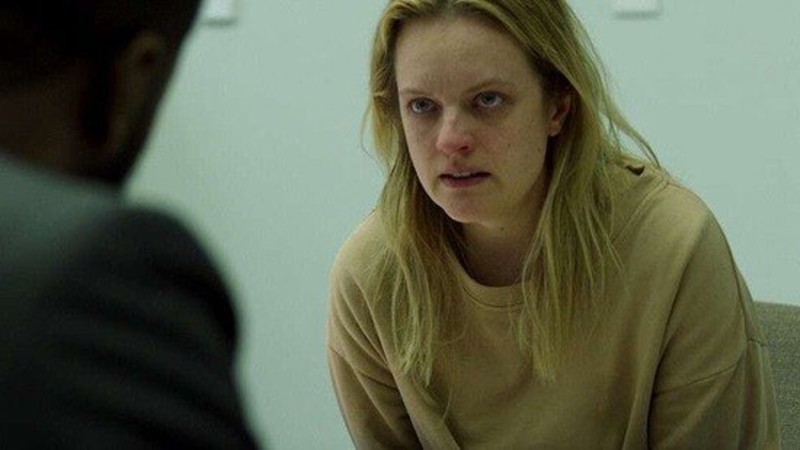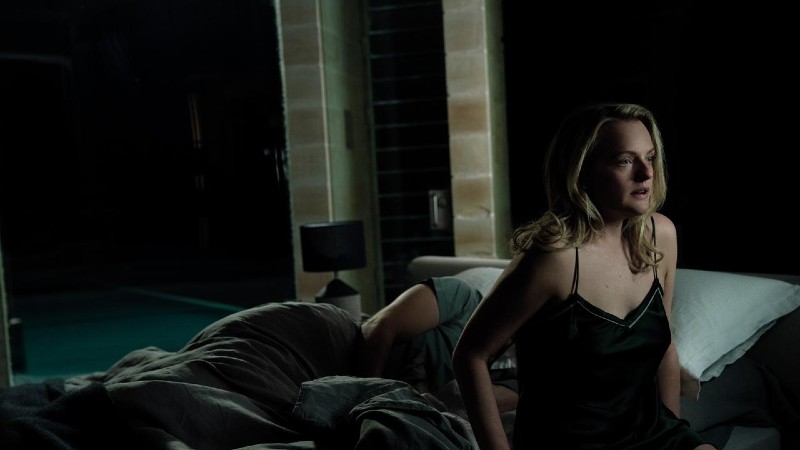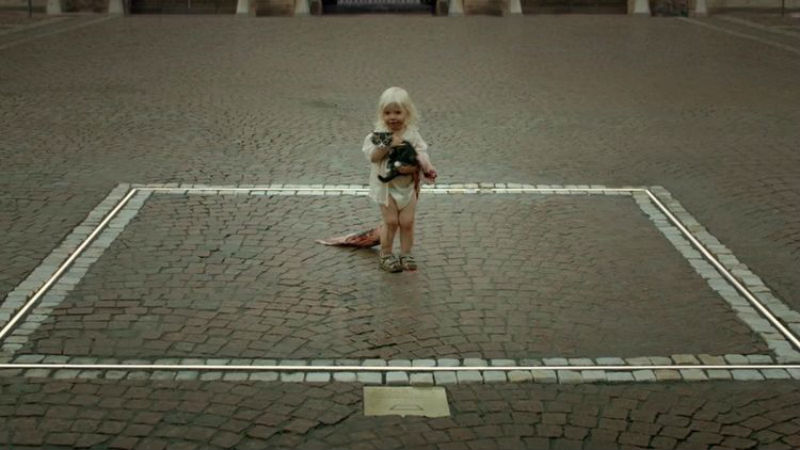Conventional stalk-and-slash thrillers make an ally of the darkness. After all, it is in the shadows that monsters hide, and that the imagination, starved of visual stimulus, fills the empty spaces with its own panicky projections. Written and directed by Leigh Whannell (Insidious: Chapter 3, 2013; Upgrade, 2018), and adapted with extreme creative licence from H.G. Wells’s 1897 novel, The Invisible Man certainly involves a lot of stalking and slashing, and certainly many of its scenes are set in the dark – but it is the premise outlined in its title which makes this a rather unconventional slasher. For even when its beleaguered heroine Cecilia Kass (Elisabeth Moss) goes about her business in daytime hours, even when at night she switches on the lights and dispels the darkness, her assailant’s invisibility means that every place in the film becomes increasingly the locus for a paranoia and dread which the viewer fast comes to share with Cecilia (whose very name is etymologically associated with blindness). Here, what you cannot see can hurt you – even in broad daylight.
At the beginning of the film, Cecilia wakes at 3.41am, carefully leaving her husband Adrian Griffin (Oliver Jackson-Cohen) – who shares his surname with Wells’s antihero – asleep in their bed, and executing a methodical plan to sneak out of their beautiful modernist dream home with its clear view of the Pacific Ocean beyond San Francisco. Adrian is charming, handsome, very wealthy, and a celebrated pioneer in the science of optics – and to all appearances, his and Cecilia’s marriage is picture perfect. Yet Adrian is also, Cecilia claims, a narcissistic sociopath, and extremely controlling of his wife – something which not even Cecilia’s sister Alice (Harriet Dyer), who picks her up outside the house, nor Cecilia’s old friend turned SFPD officer James Lanier (Aldis Hodge), who offers her refuge in his home with his teenaged daughter Sydney (Storm Reid), is entirely sure whether to believe.

In other words, Adrian’s insidiously abusive behaviour towards Cecilia is invisible to all even before he feigns suicide and dons the high-tech suit of his own invention which renders his actions more literally invisible. Now able to insinuate himself back into Cecilia’s life unnoticed by anybody – except Cecilia – he sets about terrorising and victimising her all over again, knowing that nobody will ever believe her crazy accusations against a dead man who, well, clearly isn’t there. While this makes for astonishingly tense and creepy cat and mouse, all brilliantly handled by Whannell to exploit our constant sense, in any and every scene, of a possible presence that we simply cannot see, and superbly embodied in Moss’ depiction of escalating incredulity, resigned despair and calculated defiance, it also serves as a compelling allegory for the kind of bullying and gaslighting that occur in toxic relationships, where victims are constantly expected to keep quiet, or if they do not, are so often simply not credited with telling the truth.
Indeed so twisty is the film’s narrative structure, and so blinkered the perspectives that we are invited to share on what is happening beyond the film’s visible spectrum, that we too at times are made to question Cecilia’s sanity and to entertain the suspicion that she might after all be merely inventing her nemesis as her own personality fractures. No one will listen to Cecilia, and everyone thinks she is suffering a mental breakdown – until she either is left with “no choice” but to learn to live with her persecutor’s domineering aggression (like the protagonist of Sidney J. Furie’s in many ways similar The Entity, 1982), or else start to turn the tables on her oppressor and take back some control (in the process perhaps becoming a monster herself).

Paul Verhoeven’s The Hollow Man (2000) introduced us to a science prodigy, who is also an alpha-male ‘maverick’ – the kind of figure who is typically the hero and point of identification in a Hollywood film – and then, as it followed his experiments in invisibility and the stripping away of his moral compunctions, asked us, step by step, how comfortable we still felt following this all-American winner on his eventually rape-happy, murderous descent. In Whannell’s film, Adrian is just as vindictive and even more devious, but the focus here is far less on the unseen antagonist than on the victim with whom he is messing, even as similar questions are gradually raised about the degree to which we find Cecilia’s responses to her impossible situation to be acceptable. For ultimately The Invisible Man is a variant – with sci-fi underpinnings – of the rape-revenge film, and enters all the moral grey areas associated with that subgenre.
Much as Adrian manipulates Cecilia and others, The Invisible Man manipulates the viewer, panning to, or just lingering on, the negative spaces in its locations to generate maximum unease from what would normally just be inconspicuous background, and to suggest a presence to all the absence. Coming with shades of Jaume Balagueró’s Sleep Tight (2011), Steven
Soderbergh’s Unsane (2018) and Justin Edgar’s Stalked (2019), Whannell’s film confidently updates the source material not just in terms of its science, but also in terms of its gender politics, repurposing the barebones of Wells’s premise as a potent metaphor for what we so often fail or even refuse to see in the power relationships between men and women.
The Invisible Man is in cinemas across the UK on Friday, February 28th. On VoD in June.










